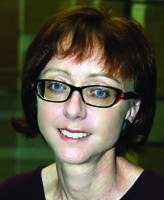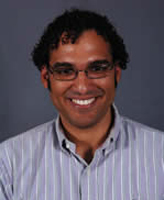
As interest in cultural sociology has risen in recent decades, so too has Notre Dame’s investment in its faculty.
“We’ve been growing over the past 20 years, but in the last five years it has all come together,” says cultural sociologist Lyn Spillman, an associate professor who has studied American political and economic culture. “We’re just about at a point where we are in the top handful of departments in cultural sociology.”
The author of a 2002 anthology on the growth of the field, Spillman attributes Notre Dame’s reputation in part to faculty hires. “I’ve been joined by these great people,” she says. “I think that’s what gives us our strength.”
The faculty now includes Professor Christian Smith, who is known for his work promoting cultural perspectives, especially on religion; Professor Eugene Halton, who studies mass culture, the arts, consumption and cultural criticism; Associate Professor Kevin Christiano, who studies culture and religion; Assistant Professor Mary Ellen Konieczny, who studies religion and gender from a cultural point of view; Assistant Professor Erika Summers-Effler, a microsociologist who has studied culture in social movement groups; and Assistant Professor Omar Lizardo, who studies culture and social networks—and is considered “one of the outstanding younger people in the field,” says Spillman.
In fall 2011, they will be joined by Erin Metz McDonnell and Terry McDonnell, whose interests in culture and society in Ghana will add significantly to the international range of cultural sociology at Notre Dame.
Spillman also points to the opportunities she and her colleagues—such as Professor Robert Fishman, a political sociologist—have to connect cultural studies with other approaches in sociology.
The subfield’s intense focus on the norms, values, rituals, and symbols people use, she explains, make it an important component to any study of sociology and even other academic disciplines.
“It’s all about meaning-making—humans all do meaning-making,” Spillman says. “What cultural sociologists are interested in is what makes those meanings and how they influence human activity.”

Lizardo, for example, examines how cultural tastes shape social relationships and networks. He says he was attracted to Notre Dame because it was a growing program with faculty that included Summers-Effler and Spillman. “It’s a broad-minded group of scholars, and my colleagues tend to be interesting people too,” he says. “Because it’s a broad field, I’m able to advise a lot of students across the board and not necessarily restricted to any one area. That’s important to me.”
When she was an undergraduate first exploring sociology, Spillman recalls, not much study had been done in the area. Now, cultural sociology makes up the largest section of the American Sociological Association. “As I went on in the field, it grew along with me,” she says.
Spillman says students have played a critical role in the growth of the subfield, developing new ideas and new applications. When she was chair of the section and organizing its 20th anniversary conference, she was struck by the quality and enthusiasm of student contributions. Today, students from many areas of study—especially graduate students—are interested in incorporating cultural sociology into their research.
“There’s a lot of demand out there for this area,” Spillman says, “and I think that’s what gives it its energy and pushes us all along.”


